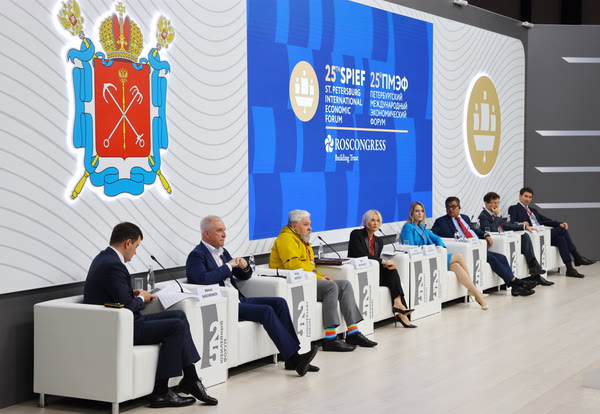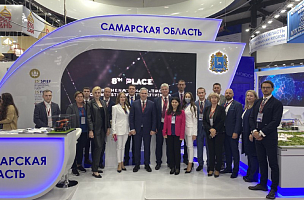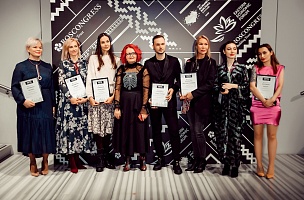Key conclusions
Russian Consumers Must Have Access to Quality Domestic Goods
“We produce oil: I think we should have cheap petrol. We make our own products: I think affordability should be substantial and normal, and then demographics will follow,” Igor Bukharov, President, Federation of Restaurateurs and Hoteliers.
“For a choice to be informed, goods have to evoke certain associations. I think all products should strive to be associated with quality as a key competence and key selling point,” Maxim Protasov, Head, Russian Quality System (Roskachestvo).
“People and their welfare must be considered. This is economic patriotism in its essence,” Aleksey Kozhevnikov, Vice President, All‑Russian Non‑Governmental Organization of Small and Medium‑Sized Businesses OPORA RUSSIA.
“The mediator between these tasks and additional motivation for business should, of course, be society and consumers, who should literally be clamouring for Russian goods,” Denis Sekirinsky, Deputy Chief of the Presidential Directorate for Science and Education Policy.
The Main Goal Now is to Build and Maintain Existing Russian Production
“As for consumers, only 7% of the population today believes that the departure of foreign companies from Russia will significantly decrease their quality of life. These figures are quite auspicious. Only 16% could name imported food products that they had grown accustomed to and would find it hard to give up if they were to leave the market,” Maxim Protasov, Head, Russian Quality System (Roskachestvo).
“Import substitution is not a cure-all. Import substitution is not an end in itself. The goal is for us to try to create an economy within ourselves so that it will be profitable and safe to do business in our country. This is true for all sectors of the economy,” Aleksey Kozhevnikov, Vice President, All‑Russian Non‑Governmental Organization of Small and Medium‑Sized Businesses OPORA RUSSIA.
“SMEs currently account for 6.7% of manufacturing in total. The share of small businesses that produce anything. But 36% of trade. It’s a situation that has to change,” Aleksey Kozhevnikov, Vice President, All‑Russian Non‑Governmental Organization of Small and Medium‑Sized Businesses OPORA RUSSIA.
PROBLEMS
There are Certain Types of Imports We Depend on More than Others
“25% of consumers have noted that Russian agriculture is unable to provide us with enough fruit, as far as risk zones are concerned. 25–30% – coffee and tea, and 10% – alcoholic beverages, primarily wine... Consumers demand not only that goods be available on the market but also that they be affordable, which is extremely important for quality as well, of course,” Maxim Protasov, Head, Russian Quality System (Roskachestvo).
“Education is a very important field. Over the last 30 years, a lot of borrowed, imported stuff has made an appearance in education. This includes the Bologna Process, online learning, tutors in place of qualified, trained educators. This includes testing in place of creative competitions, and a cookie-cutter approach in place of an individual approach. Many universities and schools continue to employ foreign software for themselves and as part of the subjects they teach,” Yana Lantratova, First Deputy Chairman of the Committee of the State Duma of the Federal Assembly of the Russian Federation on Education.
“Unfortunately, ‘Made in Russia’ hasn’t resonated with people. We can talk about technological sovereignty, and food sovereignty is a serious thing. Not just security, but specifically sovereignty. We have to provide for ourselves,” Igor Bukharov, President, Federation of Restaurateurs and Hoteliers.
Poor Communication Between Agencies Prevents Import Substitution From Developing More Quickly
“There’s so much red tape. There are so many unnecessary requirements. Think about it: more than one million federal requirements and standards now hinder the development of entrepreneurship and business and import substitution. If we start sorting them out even a little bit, if we start bringing them in line with this extraordinary situation, then almost a trillion roubles, as the entrepreneurs themselves claim, could immediately be funneled back into our country’s development,” Sergey Morozov, First Deputy Chairman of the Committee of the State Duma of the Federal Assembly of the Russian Federation on Regional Policy and Local Self-Government.
“Agencies probably don’t cooperate with each other enough on different tasks. There really isn’t any communication taking place. And like with “Made in Russia”, this is a problem. ‘Made in Russia’ is getting stuck on everything and anything right now, by everyone. There are no rules, no norms for using the brand on this or that product. It’s misleading for consumers and opens a window for those who want to discredit the ‘Made in Russia’ image, to distort the brand itself,” Mikhail Sadchenkov, General Director, National Brand ‘Made in Russia’.
SOLUTIONS
Russia is Taking Steps Towards Import Substitution in Various Fields
“The Russian Ministry of Education and Science is working hard on import substitution in education. There’s a transition to Russian software taking place right now, and meetings are taking place with Russian manufacturers. The Ministry of Education is doing a lot of work. In the face of unprecedented sanctions against our country, when the import of certain types of equipment is prohibited, and some servers aren’t working, an experiment is now taking place to create a digital educational environment,” Yana Lantratova, First Deputy Chairman of the Committee f the State Duma of the Federal Assembly of the Russian Federation on Education.
“We have already started working on improving the legal, organizational, financial, and economic mechanisms that will ensure that industry keeps working,” Sergey Morozov, First Deputy Chairman of the Committee of the State Duma of the Federal Assembly of the Russian Federation on Regional Policy and Local Self-Government.
Support for Russian Business Plays an Important Role
“When it comes to the quality of goods, we couldn’t be happier about the increase in the number of products and goods bearing the state quality label. We couldn’t be happier with the growing level of trust people are showing for the state quality label – more than 76% of people have expressed trust in it. We’re doing everything we can to protect the label’s good name, to make sure the goods bearing it have undergone sophisticated research, that they are Russian goods, locally produced, with the highest level of quality, and that they really lead sales,” Maxim Protasov, Head, Russian Quality System (Roskachestvo).
“We need to take a cross section of the industries and look at what is profitable and figure out what they need in accordance with this cross section,” Aleksey Kozhevnikov, Vice President, All‑Russian Non‑Governmental Organization of Small and Medium‑Sized Businesses OPORA RUSSIA.






